句子的重音和语调(培训用)
句子重读、连读、意群、语调

重读、连读、意群、语调
英语句子重读、连读、意群、语调
一、句子重读(读英语句子时,有些词读得重而清晰,有些读得轻而含糊。)
1、实词(名/形/副/数和实义动词)要重读。虚词(介/冠/连词和人称/关系代词等)不重读。
1/.The new book is on the desk.
2、感叹词和疑问词要重读。 1/.How hot it is today!
2/.I am so busy with my school-work and duties as monitor that I don’t have enough time to keep a balance between them .
四、语调 1、升调的使用 1/.Are you waiting for someone?↗ (一般疑问句)
I canቤተ መጻሕፍቲ ባይዱt come.
Stop talking.
三、意群与停顿:(在说话或朗读时,为了换气或将意义表达清楚,一个较长的句子可根据意思与语法结构划分为 若干部分,每一个部分被称为一个意群。意群之间可稍微停顿,但同一意群里的单词要一口 气读完。) 1/.He woke up at a quarter past six this morning.
2/.One,↗ two,↗ three,↗ four,↗ five.↘ (数数) 3/.We bought some sugar,↗ some vegetables↗ and two bottles of beer.↘ (列举事务) 2、降调的使用 1/.What do you plan to do this weekend?↘ (特殊疑问句) 2/.The train started out two minutes ago.↘ (陈述句) 3/.Please ask him to come in.↘ (祈使句) 4/.What a fine day!↘ (感叹句) 3、特殊类 1/.Are you a Chinese ↗ or a Japanese?↘ (选择疑问句,前升后降。)
英语句子重音、弱读、语调、连读、及意群

▪ 用于陈述句
降调
▪ I have already read that book. ↘
▪ That street is two miles long. ↘
▪ 用于特殊疑问句 ▪ What has happened to him? ↘ ▪ Which direction is it to the post office? ↘ ▪ 注意:特殊疑问句有时可用升调表示请别人重复刚说过的话: ▪ What is your major? ↗ ▪ Where shall we go for the holiday? ↗
不可连读的情况
当短语或从句之间按意群进行停顿时,意群与意 群之间即使有两个相邻的辅音与元音出现,也不 可连读。
▪ 9) you /jə/ ▪ What do you think?
▪ 10) your /jə/ ▪ Take your time.
▪ 11) us /əs/ ▪ Let us think it over.
▪ 12) that /ðət/ ▪ This is the house that Jack built.
maybe even good enough to come up with the next
iPhone
keeps us from turning a blind eye to corruption and to
injustice
2.“辅音+辅音”
爆破音/p/,/b/,/t/,/d/,/k/,/g/ 和摩擦音/f/,/v/,/W/, 其中任意2个相临时,前一个音会轻音化,即由相关的发音器官 做好这个发音的姿势,稍做停顿后即发后面的音。 如果这些音 在词尾,也要轻音化。
job.
朗读指导中的重音、停顿、语速、语气、语调
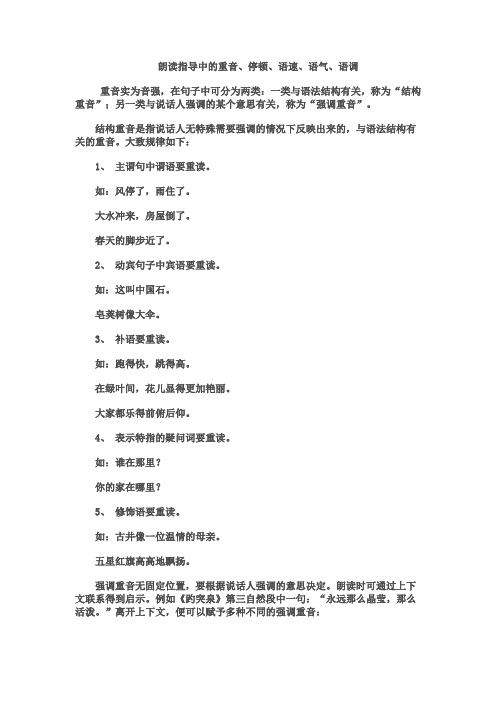
朗读指导中的重音、停顿、语速、语气、语调重音实为音强,在句子中可分为两类:一类与语法结构有关,称为“结构重音”;另一类与说话人强调的某个意思有关,称为“强调重音”。
结构重音是指说话人无特殊需要强调的情况下反映出来的,与语法结构有关的重音。
大致规律如下:1、主谓句中谓语要重读。
如:风停了,雨住了。
大水冲来,房屋倒了。
春天的脚步近了。
2、动宾句子中宾语要重读。
如:这叫中国石。
皂荚树像大伞。
3、补语要重读。
如:跑得快,跳得高。
在绿叶间,花儿显得更加艳丽。
大家都乐得前俯后仰。
4、表示特指的疑问词要重读。
如:谁在那里?你的家在哪里?5、修饰语要重读。
如:古井像一位温情的母亲。
五星红旗高高地飘扬。
强调重音无固定位置,要根据说话人强调的意思决定。
朗读时可通过上下文联系得到启示。
例如《趵突泉》第三自然段中一句:“永远那么晶莹,那么活泼。
”离开上下文,便可以赋予多种不同的强调重音:永远那么晶莹,那么活泼。
(强调水流的欢快不是吗?)永远那么晶莹,那么活泼。
(强调就是那样的。
)永远那么晶莹,那么活泼。
(强调水花的透明与闪亮。
)永远那么晶莹,那么活泼。
(强调总是那样。
)但是,联系上下文,稍作思考就会知道,应是第四种情况,重音在“永远”上,这样才能与上文的“没昼没夜”,下文的“永远……不知疲倦”相照应,充分表现原文的思想感情。
除此之外,强调重音切忌割裂句子。
往往在把句子分段之后会产生片面性。
例如“人们存心要干凶恶残酷的坏事情,那是很容易找到借口的。
”这句话如果分段来看,很容易误认为重音在修饰成分“凶恶残酷”或者在宾语“借口”上。
但是纵观全句(假设复句)就不难发现,作者愿意是说明“欲加之罪,何患无辞”,所以很显然,重音应该放在“存心”和“很容易”上。
这样,两个分句才能相互响应,起到相得益彰的作用。
特别是作为故事的结尾,更不可能仍停留在事情的表面而不去提示道理,不是吗?在实际的朗读中,结构重音与强调重音往往并存,相比之下,强调重音更为明显,此时结构重音便要服从强调重音。
朗诵中应注意的重音和句调的小知识
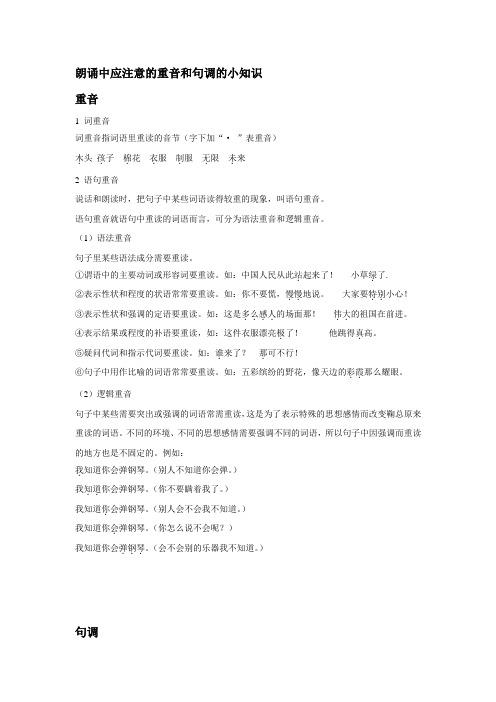
朗诵中应注意的重音和句调的小知识重音1 词重音词重音指词语里重读的音节(字下加“·”表重音)木.头孩.子棉.花衣.服制.服无.限未.来2 语句重音说话和朗读时,把句子中某些词语读得较重的现象,叫语句重音。
语句重音就语句中重读的词语而言,可分为语法重音和逻辑重音。
(1)语法重音句子里某些语法成分需要重读。
①谓语中的主要动词或形容词要重读。
如:中国人民从此站.起来了!小草绿.了.②表示性状和程度的状语常常要重读。
如:你不要慌,慢慢..地说。
大家要特别..小心!③表示性状和强调的定语要重读。
如:这是多么感人..的祖国在前进。
....的场面那!伟大④表示结果或程度的补语要重读,如:这件衣服漂亮极.了!他跳得真.高。
⑤疑问代词和指示代词要重读。
如:谁.来了?那.可不行!⑥句子中用作比喻的词语常常要重读。
如:五彩缤纷的野花,像天边的彩霞..那么耀眼。
(2)逻辑重音句子中某些需要突出或强调的词语常需重读,这是为了表示特殊的思想感情而改变鞠总原来重读的词语。
不同的环境、不同的思想感情需要强调不同的词语,所以句子中因强调而重读的地方也是不固定的。
例如:我.知道你会弹钢琴。
(别人不知道你会弹。
)我知道..你会弹钢琴。
(你不要瞒着我了。
)我知道你.会弹钢琴。
(别人会不会我不知道。
)我知道你会.弹钢琴。
(你怎么说不会呢?)我知道你会弹钢琴...。
(会不会别的乐器我不知道。
)句调句调是指整句话的音高升降的变化。
它与声调都是音高的变化形式,但声调只指一个音节(字)的音高变化。
所以又叫“字调”。
句调在句末音节上表现得特别明显,但是它是贯串在整个句子中的,所以它属于超音段成分,不同于音素、音节等音段成分。
1 句调的四种形式(1)升调调子由平升高,常用来表示反问、疑问、惊异、号召等语气。
例如:①难道我是个小孩?(反问)②王小萌来了吗?(疑问)③这件事,是他办的?(惊异)(2)降调调子先平后降,常用来表示陈述、感叹、请求等语气。
(短语重音、句子重音、节奏、语调
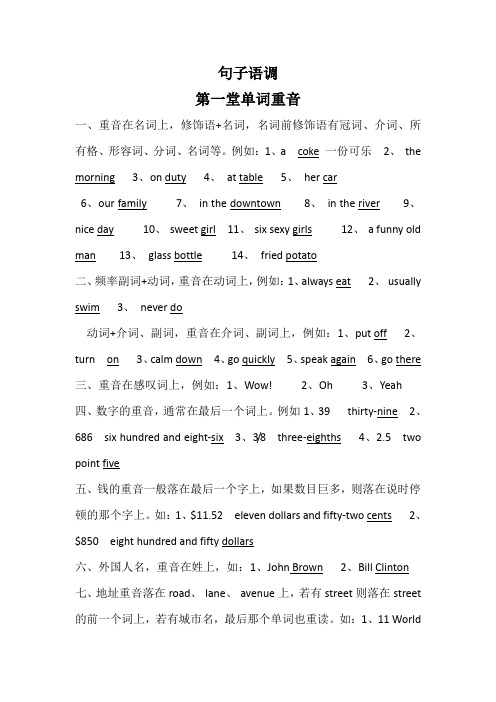
句子语调第一堂单词重音一、重音在名词上,修饰语+名词,名词前修饰语有冠词、介词、所有格、形容词、分词、名词等。
例如:1、a coke 一份可乐2、the morning 3、on duty 4、at table 5、her car6、our family7、in the downtown8、in the river9、nice day 10、sweet girl 11、six sexy girls 12、a funny old man 13、glass bottle 14、fried potato二、频率副词+动词,重音在动词上,例如:1、always eat 2、usually swim 3、never do动词+介词、副词,重音在介词、副词上,例如:1、put off 2、turn on 3、calm down 4、go quickly 5、speak again 6、go there三、重音在感叹词上,例如:1、Wow! 2、Oh 3、Yeah四、数字的重音,通常在最后一个词上。
例如1、39 thirty-nine 2、686 six hundred and eight-six 3、3/8 three-eighths 4、2.5 two point five五、钱的重音一般落在最后一个字上,如果数目巨多,则落在说时停顿的那个字上。
如:1、$11.52 eleven dollars and fifty-two cents 2、$850 eight hundred and fifty dollars六、外国人名,重音在姓上,如:1、John Brown 2、Bill Clinton七、地址重音落在road、lane、avenue上,若有street则落在street 的前一个词上,若有城市名,最后那个单词也重读。
如:1、11 Worldroad 2、200 Ross Street ,Buffalo ,New York练习:1、her baby 2、their country 3、by bus 4、in door 5、a woman 6、some people 7、on the desk 8、in a week 9、five strong man 10、small red car 11、kind woman 12、poor boy 13、pqper box 14、broken cup 15、take off 16、hurry up 17、always late 18、seldom meet 19、75 seventy-five 20、168 one hundred and sixty-eight 21、2/3 two thirds 22、1.5 one point five 23、$1.05 one dollar and five cents 24、$51.25 fifty-one dollars and twenty-five cents 25、Shelly White 26、Jessica Brown 27、83 Wooster Street 28、258 Lindley Avenue第二堂句子重音I love sweets.我喜欢糖果(强调糖果)I love sweets.我喜欢糖果(强调喜欢)I love sweets.我喜欢糖果(强调我)I love sweets.我喜欢糖果(叫喊的语气)I take a cold shower every morning.我每天早晨起来洗个凉水澡。
英语句子重读、连读、意群、语调
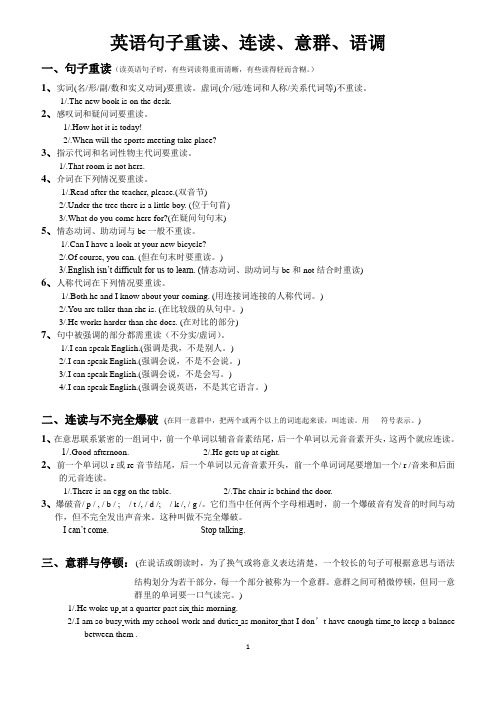
英语句子重读、连读、意群、语调一、句子重读(读英语句子时,有些词读得重而清晰,有些读得轻而含糊。
)1、实词(名/形/副/数和实义动词)要重读。
虚词(介/冠/连词和人称/关系代词等)不重读。
1/.The new book is on the desk.2、感叹词和疑问词要重读。
1/.How hot it is today!2/.When will the sports meeting take place?3、指示代词和名词性物主代词要重读。
1/.That room is not hers.4、介词在下列情况要重读。
1/.Read after the teacher, please.(双音节)2/.Under the tree there is a little boy. (位于句首)3/.What do you come here for?(在疑问句句末)5、情态动词、助动词与be一般不重读。
1/.Can I have a look at your new bicycle?2/.Of course, you can. (但在句末时要重读。
)3/.English isn’t difficult for us to learn. (情态动词、助动词与be和not结合时重读)6、人称代词在下列情况要重读。
1/.Both he and I know about your coming. (用连接词连接的人称代词。
)2/.You are taller than she is. (在比较级的从句中。
)3/.He works harder than she does. (在对比的部分)7、句中被强调的部分都需重读(不分实/虚词)。
1/.I can speak English.(强调是我,不是别人。
)2/.I can speak English.(强调会说,不是不会说。
)3/.I can speak English.(强调会说,不是会写。
句子重音和语调

句子重音和语调
读句子时,并不是每个单词都重读,只有部分单词重读,另一部分不重读,这种现象叫句子重音。
句子重音一般落到重读词的重读音节上。
一般说来,句子中的名词、动词、形容词、副词多重读,而冠词、连词、介词等虚词和人称代词、助动词、情态动词等一般不重读。
但具体问题具体分析,当说话者要把两种人、两件事进行对比时,对比的人或事要重读,如:It is `my mistake, not `yours. 助动词、情态动词等位于句末或与not结合在一起时要重读,如:Yes, we `are. That `isn\'t my classroom. 另外,在特定情景中,那些传递新信息的关键词要重读,如:-`What are they `looking at? -They are looking at a car.
如果说话人要强调或突出某种意思,可将该词重读,如:He isn\'t `in.。
句子重音和语调规则回顾
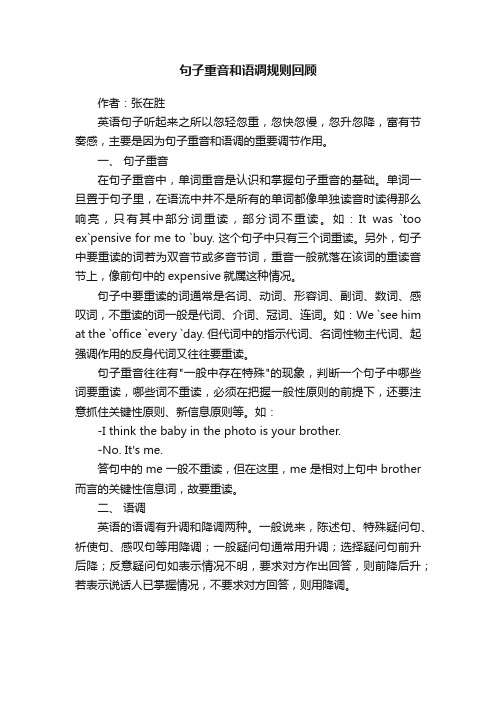
句子重音和语调规则回顾作者:张在胜英语句子听起来之所以忽轻忽重,忽快忽慢,忽升忽降,富有节奏感,主要是因为句子重音和语调的重要调节作用。
一、句子重音在句子重音中,单词重音是认识和掌握句子重音的基础。
单词一旦置于句子里,在语流中并不是所有的单词都像单独读音时读得那么响亮,只有其中部分词重读,部分词不重读。
如:It was `too ex`pensive for me to `buy. 这个句子中只有三个词重读。
另外,句子中要重读的词若为双音节或多音节词,重音一般就落在该词的重读音节上,像前句中的expensive就属这种情况。
句子中要重读的词通常是名词、动词、形容词、副词、数词、感叹词,不重读的词一般是代词、介词、冠词、连词。
如:We `see him at the `office `every `day. 但代词中的指示代词、名词性物主代词、起强调作用的反身代词又往往要重读。
句子重音往往有"一般中存在特殊"的现象,判断一个句子中哪些词要重读,哪些词不重读,必须在把握一般性原则的前提下,还要注意抓住关键性原则、新信息原则等。
如:-I think the baby in the photo is your brother.-No. It's me.答句中的me一般不重读,但在这里,me是相对上句中brother 而言的关键性信息词,故要重读。
二、语调英语的语调有升调和降调两种。
一般说来,陈述句、特殊疑问句、祈使句、感叹句等用降调;一般疑问句通常用升调;选择疑问句前升后降;反意疑问句如表示情况不明,要求对方作出回答,则前降后升;若表示说话人已掌握情况,不要求对方回答,则用降调。
- 1、下载文档前请自行甄别文档内容的完整性,平台不提供额外的编辑、内容补充、找答案等附加服务。
- 2、"仅部分预览"的文档,不可在线预览部分如存在完整性等问题,可反馈申请退款(可完整预览的文档不适用该条件!)。
- 3、如文档侵犯您的权益,请联系客服反馈,我们会尽快为您处理(人工客服工作时间:9:00-18:30)。
• • • • • • • • • •
Did you need a map? Don‟t tell me he‟s asleep. Come along home if you like. Would you like a walk now? Can I help you? What can I do for you? I‟m afraid he is out. Peter is out now. Give me an example. They‟ve been away for ages. The work is half finished.
cannot不缩写成can‟t 时,重音也在can 上
I 'cannot agree 'with him.
24
动词 be(是),have(有)一般不重读 I have „so many ‟things to „do to‟day. „Few ‟people had „TV ‟sets in „those ‟days. The „key was ‟in the „box.
He‟s an 'easy person to 'get a'long with. He‟s the 'right man for the 'job. It‟s al'ready 'lunch time.
(比较; It‟s 'time for 'lunch.)
13
代词
14
常重读的代词有 1.指示代词
I 'don’t want to 'go there to'day. He 'wasn’t sur'prised when I 'told him the 'news. We 'can’t 'stay any 'longer. 'Don’t you think you 'shouldn’t say 'such things? We must 'do it 'now, 'mustn’t we?
19
动词
20
动词
实意动词、行为动词都要重读 (be、have 除外) He „takes a ‟walk after „supper ‟every „day. ‟Don‟t for„get your ‟homework. I sup„pose you ‟know him.
非谓语动词一般也都要重读
10
名词
11
名词
一般都重读
There is a 'book on the 'desk. My 'sister 'put up a 'picture on the 'wall. 'John 'wants to 'see the 'teacher after 'class An 'elephant is an 'animal.
25
副词
26
副词一般都重读
They 'came 'back 'early 'yesterday. 'Where did you 'buy it? 'Why do you 'come? You 'meet 'people 'everywhere. I‟ve 'never 'heard of 'such a thing be'fore. Per'haps she‟ll ar'rive to'night. 'Tell him to 'come 'in. 'Thank you for 'coming to 'see me 'off.
5
• • • • • • • • •
It doesn‟t fit you right. Would you mind if I smoke? But you were late last night! He‟ll live alone for the rest of his life. I‟ll go out for a couple of weeks. I‟m just out of money. Do you want to end up like this? Best wishes for you! We‟ve got go. See you!
I 'do hope 'this will be ef'fective. He 'does need your 'help. We 'did warn you be'fore. 'Do 'drop 'in when you are in 'Xuzhou.
22
不重读的动词
助动词
He did 'not work 'hard for the e'xam. We were im'pressed by their a'chievements. 'Much has been 'said a'bout it. They will be sur'prised at 'that.
2
• • • • • • • • • • • •
Could you speed it up, please? Would you mind if I tried it? Aren‟t you Bob Barker? Can‟t you see it my way for a change? Don‟t you get it? I should have told you. Tell her (that) I miss her. Tell him (that) I miss him. Did you eat? No, did you? Why don‟t you get a job? I don‟t know, it‟s too hard.
whatever, whichever ,whoever, whomever
'Who are you 'talking to? 'What can I 'do for you? 'Who 'came to 'see you this 'morning?
16
不重读的代词有:人称代词,反身代词,形容 词性物主代词,关系代词 He 'hasn‟t 'seen my 'brother yet. He 'hurt himself when he was 'playing 'football. They 'often 'help each other. The 'girl who 'spoke to you just 'now is my 'sister.
• Reading aloud is very important for beginners • Reading aloud /is very important / for beginners
• Early to bed and early to rise makes a man healthy, happy, and wise. • Early to bed / and early to rise / makes a man / healthy, happy, and wise.
不定式 分词 动名词
We de„cided to ‟start the „next ‟day. We 'sat at the 'desk 'writing a 'letter. It‟s 'no 'use 'asking him about 'that.
21
Do 用于肯定句中表示强调时,总是重读的
12Leabharlann 一些含义较广,本身没有很确切内容的名 词,如thing, person, place, 或指一大类人 或事物的名词,如 man, woman, fellow, time, ship,前面有修饰语缩小其范围时,这 类名词通常不重读
'That‟s a 'nice thing.
(比较: 'That‟s a 'nice 'picture.)
17
形容词&数词
18
形容词(包括分词作形容词)一般都应重读 数词一般都应重读 The 'streets are 'wide, 'clean and 'beautiful. 'This 'narrow 'valley was the 'scene of a 'famous 'battle. His 'first daughter is fif'teen. It‟s a 'dull and disap'pointing film. 'That‟s ex'citing news. He 'bought 'ten 'cups and 'I bought only 'four.
15
2. 名词性物主代词
‘Yours is ‟much „nicer than ‟mine. The „red one is ‟his.
但在双重所有格中,物主代词往往不重读
I‟m „writing to a ‟friend of mine.
